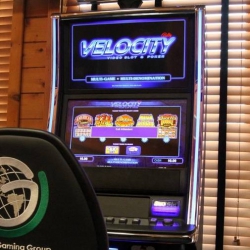The governor of Illinois has stopped video gambling payments to local municipalities, saying the state government does not have the authority to distribute profits until a budget is passed. Gov. Bruce Rauner, the Republican governor, is at an impasse with the Democrats who control the state legislature over a budget.
Gov. Rauner’s decision is the latest move in a stalemated negotiation. While the governor legitimately can say that he does not want to overstep bounds when it comes to using public funds without a budget, his opponents are charging that the governor is playing politics. Cutting off payments to local communities can be seen as a way to give city level politicians reasons to complain to the state legislature.
Loss of Funds Won’t Be Missed…Right Now
If Mayor Will Stephens of Murphysboro, Illinois can be believed, then the temporary loss of those funds are not going to put pressure on the cities and towns which support video gambling machines in bars and restaurants. Mayor Stephens says his city receives about $4,500 a month in gaming revenues from the state. Though that represents a significant sum of money to a smaller community, the mayor says his town can afford to wait.
Mayor Stephens told KFVS 12 News, “We certainly hope there will be a budget completed sometime in the near future. And we assume that those back payments will be paid at that time, so I guess in the end term it could affect us some in a cash flow manner but I don’t think it puts us in any position to lay off employees or anything of that nature.”
No One Department Receives Money
In Murphysboro, the gaming machine profits do not go to any one department. Instead, they go into a general fund, so the cash is budgeted to the various city departments as it’s needed. The money is not earmarked for specific uses, so no one single project or office is harmed immediately. Since the payments do not directly pay the salary of an employee, no one is set to be terminated. If the impasse continued for months, that might be a different matter.
Leslie Munger Studying the Issue
When asked about the gaming machine funds, Illinois Comptroller Leslie Munger says attorneys in her office are studying the issue. Readers might expect an update on their decision if and when the state comptroller arrives at a conclusion.
Illinois Video Gaming Info
Video gambling machines are a controversial topic in Illinois, even in calmer times. Since a law was passed in 2009 which allowed local communities to legalize video gambling machines–similar to slot machines–many towns and smaller cities in Illinois have legalized video gambling machines.
In those communities, restaurants and bars have installed gaming machines to help bolster revenues. Such gaming revenues help Mom-and-Pop establishments stay in business and prosper, while the city treasuries gain valuable revenues. But not everyone likes having video gambling machines in their community.
Opponents of Video Gaming
Religious groups and sociologists complain about the moral decay brought by video gambling, while many average citizens themselves have moral qualms about real money gambling in their town. No doubt, problem gamblers exist in these communities and citizens hear the stories of friends, family members, and neighbors having trouble.
Communities which choose to ban video gambling see nearby towns collect higher revenues than they do, while their own citizens drive to the next town over to gamble (and spend cash). This blog reported last month on an Illinois town which was the last in its county to legalize video gambling. That community continues to debate whether it’s best to allow gaming receipts to go to their neighboring townships.
For now, all of them are in the same fix. In fact, those towns with legal video gambling have it worse for the time being. Those towns which have legalized video gaming machines continue to see gamblers lose money to the state, yet the state government are not paying those revenues back to the local communities.
Gov. Bruce Rauner and the Illinois state legislature have to resolve their dispute before that happens.

